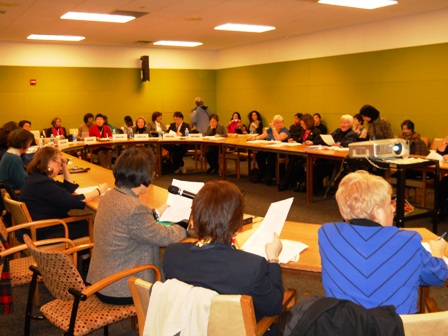| 1.Date | February 28, 2011(Monday)13:15~14:45 |
| 2.Venue | UN North Lawn Building, Conference Room B |
| 3.Theme | “Empowerment of Women in Rural Japan” |
| 4.Panelists | Masami Shinozaki (KFAW Chief Researcher) ”Present Conditions and Challenges of Japanese Rural Women” |
| Setsuko Furuya (Director, Furuya Farm Ltd.) ”From a Farmwife to a Director of Farming Company―43 years of my experience as a farmwomen―” | |
| Hitomi Nakamichi (Associate Professor, Ehime University) ”Present Status and Issues of Japanese Women in Fisheries” | |
| Yuko Enomoto (Associate Expert, Gender Equality Division,
Japan International Cooperation Agency) ”Japan’s International Cooperation related to Women’s Empowerment in Rural Community” | |
| 5.Numbers of attendees | 67 |
| 6.Organizers | International Women’s Year Liaison Group, National Women’s Committee of the UN NGOs, Japan Women’s Watch |
In the United Nations, UN WOMEN was inaugurated in July 2010 as part of continued UN reforms by integrating four women-related bodies, including DAW (Division for the Advancement of Women) and UNIFEM (United Nations Development Fund for Women). The mission of this new organization is the promotion of equal rights for the empowerment of women. The CSW (Commission on the Status of Women), a commission of the United Nations Economic and Social Council (ECOSOC), has been designated as one of the main works of UN WOMEN.
The 55th CSW’s priority theme this year was “Access and participation of women and girls to education, training, science and technology, including the promotion of women’s equal access to full employment and decent work.”
During the CSW, a parallel event to report on the actual situation in Japan related to the priority theme of the following year. This event was organized by three women’s NGOs in Japan under the sponsorship of the Permanent Mission of Japan to the United Nations. The 56th CSW’s priority theme is “RURAL WOMEN (women in farming, mountain and fi shing villages).” Thus, the theme of the event this time was “Rural Women Empowerment.” We arrived in New York on February 27, and participated as presenters in this symposium held on March 1st in the UN North Lawn Building.
After a speech by Hiroko Hara from the JAWW (Japan Women’s Watch) as the representative of NGOs, Mihoko Ejiri gave a speech on behalf of 53 organizations. The symposium then commenced under the chairmanship of Mariko Bando, president of Showa Women’s University and president of the Rural Women Empowerment and Life Improvement Association.

At first, Shinozaki reported on the general situation of women’s status and their problems and various measures for empowerment, which have been particularly implemented since the 1990s to deal with these problems. These problems include aging, unpaid work and signifi cantly reduced pensions after retirement as well as the low ratio of women’s participation in decision-making processes. The low ratio is far from the target “202030,” in which female leaders should account for at least 30 percent in all fields by 2020 in farming villages in Japan. Following Shinozaki, Setsuko Furuya from Fukushima Prefecture, who has engaged in farming with her husband and also become an executive of an incorporated company by introducing “factory farming,” was well received for her speech on her own empowerment. Then, Hitomi Nakamichi from Ehime University and Yuko Enomoto, JICA’s associate expert, reported respectively on the present situation and problems of women in fisheries in Japan (which are not well-known to the world). They gave examples of support through Japan’s international cooperation for women in farming villages in developing countries. Questions about rarely known fields in Japan, which were introduced in their reports, came from approximately 70 participants one after another despite the short time allocated for Q+A. In all of these reports, different sides of industrialized Japan, particularly the successful case of Setsuko Furuya, seemed to strike a responsive chord among participants, who are involved in the empowerment of women in developing countries. In addition to the report on women in fisheries, which provided good information, participants from developing countries showed interest in the actual support situation in Japan.
Next year, with these topics being priority themes, we would like to point out the importance of personal efforts and individual resources related to the empowerment of women in farming, mountain and fi shing villages. We would also like to emphasize the significance of factors such as economic and informational support for women married to farmers as well as the active awareness raising on gender equality of men in farming, mountain and fishing villages.


